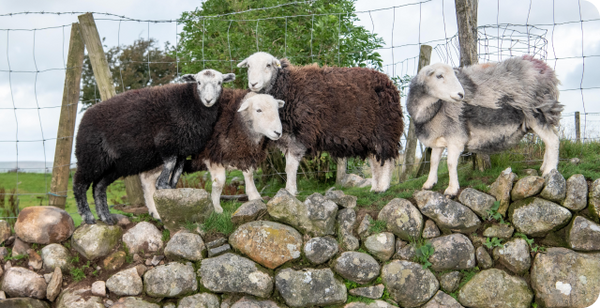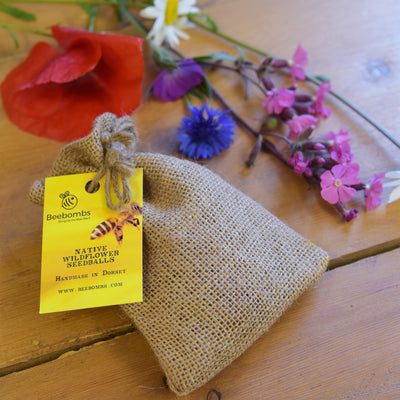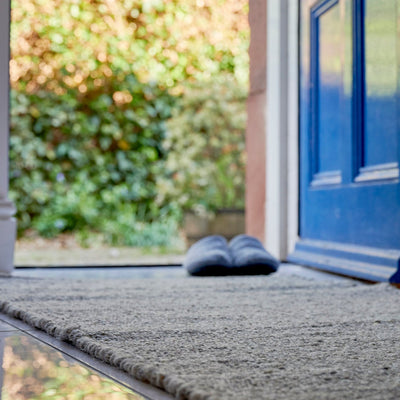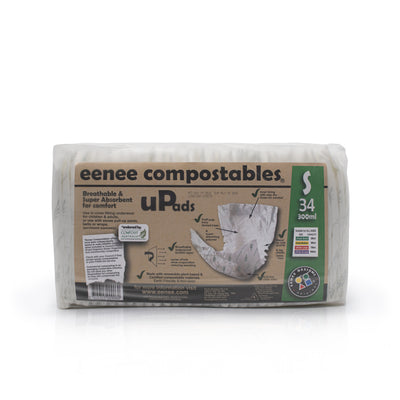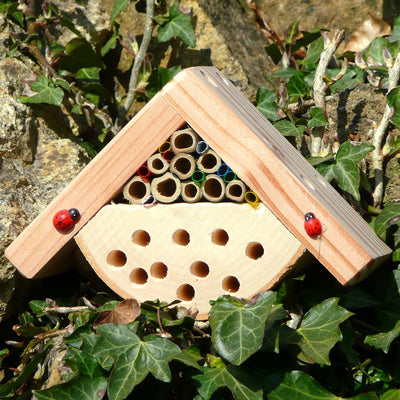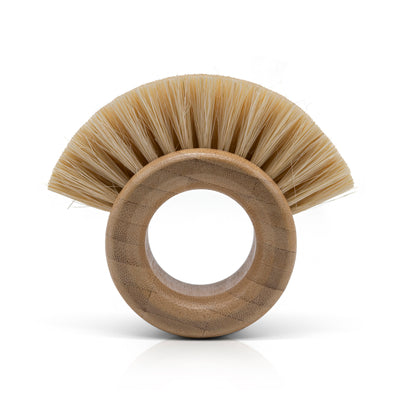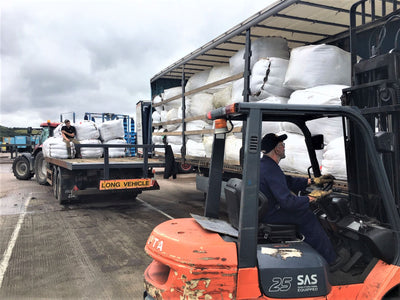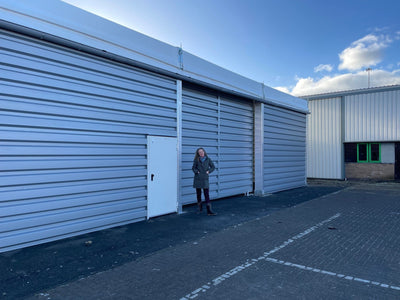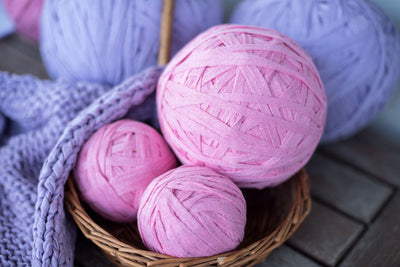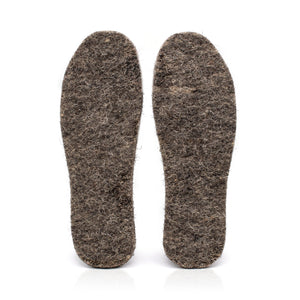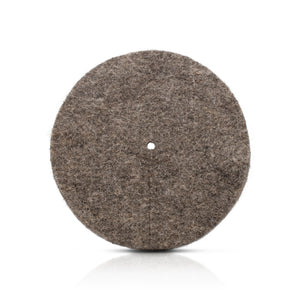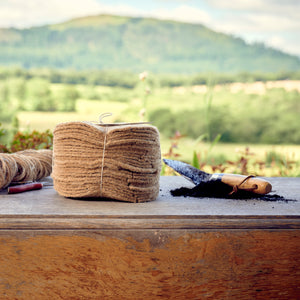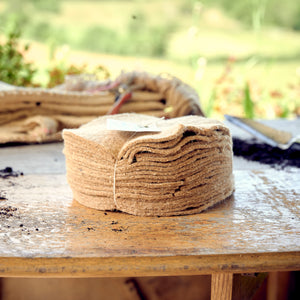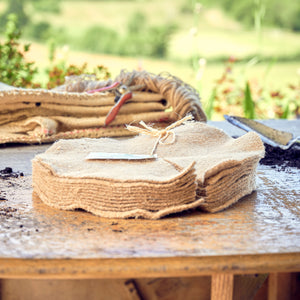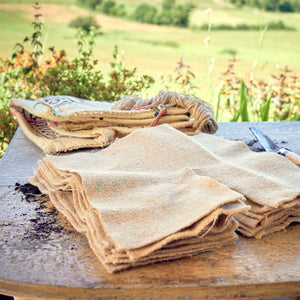What sort of plant varieties should I plant in this rubber root trainer?
This rubber root trainer is great for any seeds, seedlings plugs and cuttings of plant varieties that are sensitive to root disturbance or require deep root beds. We love using them for sweet peas, maincrop beans and peas, for trees (particularly when we are growing trees for our Buy Land Plant Trees project) and for taking cuttings. The root trainers force the plant roots to grow down and deep which the legumes varieties love. The cutting's roots bulk up more quickly giving you stronger plants, quicker. For trees, the deep-reaching roots will add further stability which helps when they get to be planted out. These ones also have unique ridges on the inside of the cells to ensure the development of a healthy root system.
Having said that, they are great for any seed really but if a long root run isn’t your main aim, take a look at our rubber seed trays.
Why is this rubber root trainer better than plastic ones?
These rubber root trainers are a more sustainable and practical option than the conventional plastic root trainers for a number of reasons:
-
Reusable and long-lasting – each of the rubber root trainers is made of a robust natural rubber. This means that they will stand the test of time and can be used, year after year. Many of the plastic ones you find in garden centres, although are cheaper, often crack or break after one or two uses. What does that mean? They get thrown away and new ones are bought year after year. That extra plastic waste isn’t great for the environment (as we all know) and financially, you aren’t much better off as you are spending money year after year. These reusable, rubber root trainers prevent all of that. Win, win!
-
Sustainable and renewable source – the plastic root trainers are made from disposable plastic that is made using fossil fuels. Again, we are all well versed that this isn’t environmentally friendly. Our rubber version is made from FSC natural rubber. This means that it comes from a sustainable and renewable source and from suppliers who preserve the biological diversity of the natural forest. The rubber plantations are also certified not to have replaced natural forests.
-
Easy to remove seedlings – as well as being environmentally better than the plastic seed tray, the rubber seed trays are practically better too, which is why we love them so much. When ready to plant out your seedlings, root trainers have a mechanism where you can open each cell. Although some of the plastic ones do this as well, we’ve found that due to the robust and flexible nature of the rubber, when you pop our bundles out, they release a lot easier and the soil retains its shape better which keeps the roots intact and makes for an easy and stress-free transfer!
How are these root trainers fair trade?
Unlike the plastics industry, which is controlled by a few massive multinationals, natural rubber is an entirely sustainable product, which is grown by small farmers or on plantations. Due to the extremely low current price of natural rubber, a lot of rubber plantings are under threat from conversion to palm oil or beef production. So when you buy these rubber root trainers, you ensure the survival of a valuable, natural resource.
Rubber trees are tapped by small scale farmers or plantation workers, in theory providing an important source of revenue however, at present the price for natural rubber does not even cover the cost of production. But because these come from a supplier who is a member of the Fair Rubber Association, they pay our primary suppliers a fair trade premium of EUR 0.50 kg/DRC (Dry Rubber Content) – at present almost 40% above world market prices (similar to what we do with Operation Wool). This helps to improve the working and living conditions of the primary producers and ensures environmentally friendly, sustainable production.
How do I use this root trainer?
Just like you would use a regular root trainer really! Here are some simple steps:
- Loosely fill your cells with seed compost (no need to wet it first).
- We like to start our seedlings off in our coir seed coins and then transplant them into the root trainer using the Dalefoot wool compost. You can plant your seeds straight in if you like using seed compost.
- If planting seeds straight in, place two to four seeds on the surface of the compost, and gently press the seeds down so they're nestled in nicely. Make sure you refer to the seed packet for the correct depth to plant the seeds and then cover them with a layer of compost to germinate.
- Don’t forget to label your trays to ensure you know what you’ve planted (we are speaking from experience here!).
- Gently water the cells, with a spray bottle, taking care not to wash out any compost or the seeds.
- We then like to place our root trainers onto a length of water-soaked sheep wool garden felt as it acts as a brilliant capillary matting. The wool absorbs and holds the water really well. The small holes in the base of each cell in the tray enable the moisture to slowly be reabsorbed back into the compost, ensuring that your plants get a steady supply of moisture rather than soaking and drying. You can use this in the bottom of larger pots or on the surface of your garden beds as extra support and protection when planting out.
- If you are using a propagator, you can place the cell tray in your propagator, with the lid on. Once you see roots emerging from the holes in the base of the cell your seedlings will be ready for transplanting into larger pots.
What other plastic-free gardening products do you have?
Oh we have lots! In fact, pretty much all our gardening products are natural and plastic-free. We have our natural rubber seed trays and a whole range of wool garden products including felt shillies, wool pellets and garden fleece. We also have lots of jute products like our mulch mats, hanging basket liners and jute roll for larger areas. Have a good gander and see what you could use in your garden.
What sort of plant varieties should I plant in this rubber root trainer?
This rubber root trainer is great for any seeds, seedlings plugs and cuttings of plant varieties that are sensitive to root disturbance or require deep root beds. We love using them for sweet peas, maincrop beans and peas, for trees (particularly when we are growing trees for our Buy Land Plant Trees project) and for taking cuttings. The root trainers force the plant roots to grow down and deep which the legumes varieties love. The cutting's roots bulk up more quickly giving you stronger plants, quicker. For trees, the deep-reaching roots will add further stability which helps when they get to be planted out. These ones also have unique ridges on the inside of the cells to ensure the development of a healthy root system.
Having said that, they are great for any seed really but if a long root run isn’t your main aim, take a look at our rubber seed trays.
Why is this rubber root trainer better than plastic ones?
These rubber root trainers are a more sustainable and practical option than the conventional plastic root trainers for a number of reasons:
-
Reusable and long-lasting – each of the rubber root trainers is made of a robust natural rubber. This means that they will stand the test of time and can be used, year after year. Many of the plastic ones you find in garden centres, although are cheaper, often crack or break after one or two uses. What does that mean? They get thrown away and new ones are bought year after year. That extra plastic waste isn’t great for the environment (as we all know) and financially, you aren’t much better off as you are spending money year after year. These reusable, rubber root trainers prevent all of that. Win, win!
-
Sustainable and renewable source – the plastic root trainers are made from disposable plastic that is made using fossil fuels. Again, we are all well versed that this isn’t environmentally friendly. Our rubber version is made from FSC natural rubber. This means that it comes from a sustainable and renewable source and from suppliers who preserve the biological diversity of the natural forest. The rubber plantations are also certified not to have replaced natural forests.
-
Easy to remove seedlings – as well as being environmentally better than the plastic seed tray, the rubber seed trays are practically better too, which is why we love them so much. When ready to plant out your seedlings, root trainers have a mechanism where you can open each cell. Although some of the plastic ones do this as well, we’ve found that due to the robust and flexible nature of the rubber, when you pop our bundles out, they release a lot easier and the soil retains its shape better which keeps the roots intact and makes for an easy and stress-free transfer!
How are these root trainers fair trade?
Unlike the plastics industry, which is controlled by a few massive multinationals, natural rubber is an entirely sustainable product, which is grown by small farmers or on plantations. Due to the extremely low current price of natural rubber, a lot of rubber plantings are under threat from conversion to palm oil or beef production. So when you buy these rubber root trainers, you ensure the survival of a valuable, natural resource.
Rubber trees are tapped by small scale farmers or plantation workers, in theory providing an important source of revenue however, at present the price for natural rubber does not even cover the cost of production. But because these come from a supplier who is a member of the Fair Rubber Association, they pay our primary suppliers a fair trade premium of EUR 0.50 kg/DRC (Dry Rubber Content) – at present almost 40% above world market prices (similar to what we do with Operation Wool). This helps to improve the working and living conditions of the primary producers and ensures environmentally friendly, sustainable production.
How do I use this root trainer?
Just like you would use a regular root trainer really! Here are some simple steps:
- Loosely fill your cells with seed compost (no need to wet it first).
- We like to start our seedlings off in our coir seed coins and then transplant them into the root trainer using the Dalefoot wool compost. You can plant your seeds straight in if you like using seed compost.
- If planting seeds straight in, place two to four seeds on the surface of the compost, and gently press the seeds down so they're nestled in nicely. Make sure you refer to the seed packet for the correct depth to plant the seeds and then cover them with a layer of compost to germinate.
- Don’t forget to label your trays to ensure you know what you’ve planted (we are speaking from experience here!).
- Gently water the cells, with a spray bottle, taking care not to wash out any compost or the seeds.
- We then like to place our root trainers onto a length of water-soaked sheep wool garden felt as it acts as a brilliant capillary matting. The wool absorbs and holds the water really well. The small holes in the base of each cell in the tray enable the moisture to slowly be reabsorbed back into the compost, ensuring that your plants get a steady supply of moisture rather than soaking and drying. You can use this in the bottom of larger pots or on the surface of your garden beds as extra support and protection when planting out.
- If you are using a propagator, you can place the cell tray in your propagator, with the lid on. Once you see roots emerging from the holes in the base of the cell your seedlings will be ready for transplanting into larger pots.
What other plastic-free gardening products do you have?
Oh we have lots! In fact, pretty much all our gardening products are natural and plastic-free. We have our natural rubber seed trays and a whole range of wool garden products including felt shillies, wool pellets and garden fleece. We also have lots of jute products like our mulch mats, hanging basket liners and jute roll for larger areas. Have a good gander and see what you could use in your garden.



